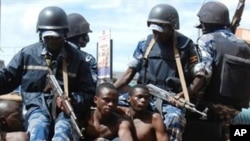Uganda’s Foreign Minister has dismissed as uninformed growing criticism that President Yoweri Museveni’s government is becoming increasingly repressive.
Henry Oryem Okello said that comments about Uganda’s human rights record are not based on the situation in the country.
“In Uganda there is no group or individual who is stopped from demonstrating or exercising their rights. What we are asking is simply [this], when you want to exercise those rights, exercise them in conjunction with the police.”
Okello, who was speaking from Arusha in Tanzania, said there was need to inform the police of any demonstrations so that the rights of others are not interfered with.
The United States State department has expressed concern about Uganda’s deteriorating human rights record.
The British House of Commons on Tuesday also said that respect for fundamental freedoms and civil liberties were rapidly declining amidst the most appalling abuses of human rights in Uganda.
The international outcry is a result of rising cases of police brutality against opponents of President Museveni’s regime and journalists.
The American Embassy in Kampala has condemned the alleged sexual assault on the leader of the opposition Forum for Democratic Change (FDC) women’s league, Ms. Ingrid Turinawe, during her arrest last week.
Local media quoted a US embassy official Dan Travis as saying, “We condemn any excessive use of force by police or protestors. We urge the Uganda government to respect citizen rights to assemble freely and encourage Uganda to investigate allegations of excessive use of force by security services.”
But Okello blamed the demonstrators for the violence that has characterized activities of opposition politicians and other civil rights groups. “The intention of these demonstrators is the removal or change of government,” he said.
Whenever they hold these demonstrations, he continued, “They hire thugs and goons who provoke the police and put the police in an untenable position of having to react in self-defense.”
The minister admitted that the police have made mistakes that the government has acknowledged even in parliament. “Whatever the police have done, the government of Uganda doesn’t condone the use of brutal force against peaceful demonstrators.”
He promised the government “will do everything possible to investigate those mistakes to the very end.”
Since President Yoweri Museveni's controversial 2011 re-election, there has been a wave of opposition demonstrations - many of which have ended in violence and arrests.
Ugandan security forces have used force in arresting opposition politicians and their supporters who take part in protests against government corruption, spiraling food and fuel prices by walking to work.
The walk-to-work protest, as it is called, began in April 2011. A group calling itself Activists for Change (A4C) organized the demonstrations and opposition politicians - keen to show they are concerned about people's discontent over rising prices - heeded the call to take part.
At least nine people were killed and hundreds have been arrested during these protests.




